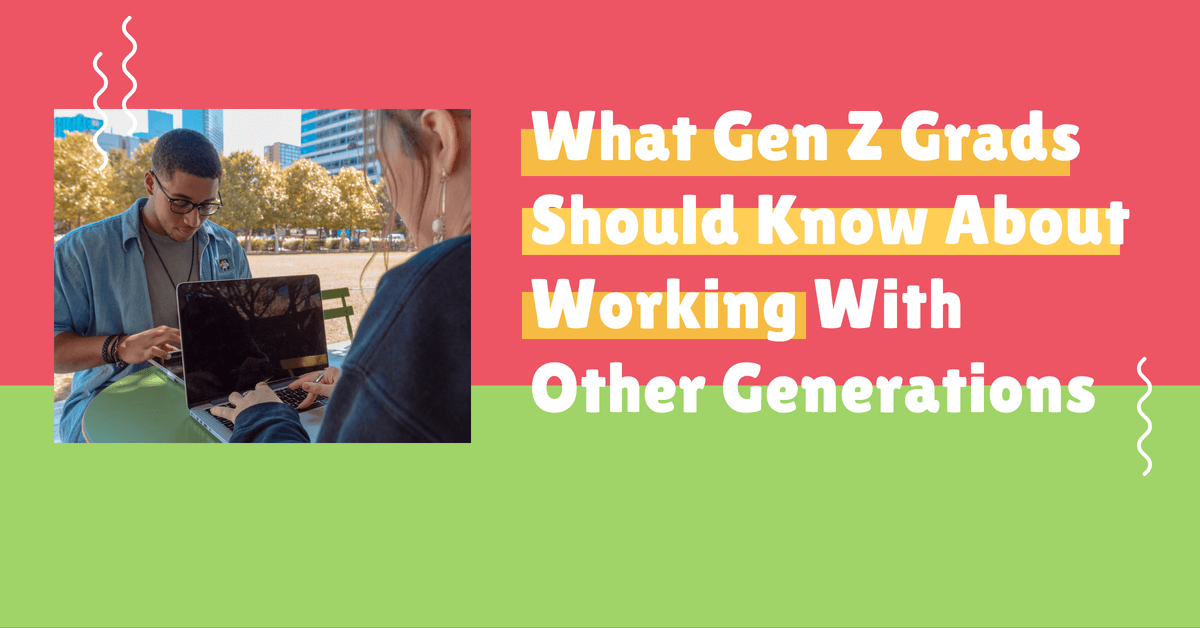What Gen Z Grads Should Know About Working With Other Generations
 Gen Z GradsToday, five generations span our workforce — traditionalists, baby boomers, Generation X, millennials and Generation Z. Each group seems to carry their own characteristics, experiences and attitudes, all of which impact their work style. It’s important to recognize each generation so you can communicate with them effectively.
Gen Z GradsToday, five generations span our workforce — traditionalists, baby boomers, Generation X, millennials and Generation Z. Each group seems to carry their own characteristics, experiences and attitudes, all of which impact their work style. It’s important to recognize each generation so you can communicate with them effectively.
Explore each generation’s aspects to understand their viewpoints more in-depth.
Every Generation, Defined
Sure, we’ve heard about baby boomers and millennials. What about those born before 1946, otherwise known as the traditionalists or the silent generation? If you know about each generation, you can take a more thoughtful approach at work. You’ll encounter many different bosses and co-workers who fit within these categories, so it’s essential to be able to relate to them on some level.
Here are a few crucial details about each generation:
1. Traditionalists (1928 - 1945)
This generation endured many hardships, like the Great Depression and World War II. They’re often referred to as the silent generation because their parents prioritized a strict, orderly household. As a result, they’re a group that works hard and respects authority. You may not find many traditionalists at your job, but some haven’t yet retired.
2. Baby Boomers (1946 - 1964)
Post-World War II, many families expanded, as did the United States’ economy. Because of this growth, many baby boomers needed to compete with one another to secure roles at school and work. This generation tends to be independent, motivated and self-reliant. Like traditionalists, they value a hard day’s work.
3. Generation X (1965 - 1980)
Gen Xers entered a wildly different world when they were born. Their mothers had started to enter the workforce, so they turned into latch-key kids — and now, they’re resourceful, flexible and self-sufficient. They’re also more educated than prior generations, as at least 29% of Gen X holds a bachelor’s degree.
4. Millennials (1981 - 1996)
Currently regarded as the largest generation, millennials grew up through the information age. They’ve always known technology as a part of their everyday lives, so you can expect them to be tech-savvy. At work, they seek out fewer hours to maintain a better work-life balance. They’re also achievement- and team-oriented.
As one of the recent Gen Z graduates, you can expect to collaborate alongside every generation. Mostly, you’ll encounter millennials, as there’s more than 83 million of them today. Now that you’re aware of their traits, you can better understand how to work with each generation.
How to Work With Other Generations
Above all else, communication matters. You can’t anticipate every interaction, but excellent communication skills are necessary to strive for a positive experience. This way, you can build significant, meaningful bonds. Here are a few key points to remember as you apply for jobs:
- Be open to new practices: You may think traditionalists are old-fashioned, but they can teach you various skills — and vice versa. Try not to let differences affect your relationships. Instead, you should strive to be more perceptive. Everyone knows workplaces can’t function without respect.
- Embrace different approaches: For instance, you wouldn’t text a baby boomer to ask about a presentation. They may not see your message! Instead, you could stop by their office to discuss it in-person. Do your best to learn about your boss’s and co-workers’ tendencies. Then, you can establish cohesive communication styles.
- Think about life experiences: We’ve all lived through different events. It’s easy to forget about those experiences at work, so don’t make assumptions. If you can recognize and accept everyone’s backgrounds, you can make a positive impact at work.
Each generation embodies separate characteristics, from traditionalists to Gen Zers. It’s up to every employee to be open-minded and empathetic so communication isn’t an issue.
Use These Tips as You Enter the Workforce
Over the next few years, Gen Z graduates will start to work alongside four other generations. Use these tips to communicate successfully across the board.
About the Author
Alyssa Abel is an experiential education writer with a love for learning. Read more of her work for students and educators on her blog, Syllabusy.



